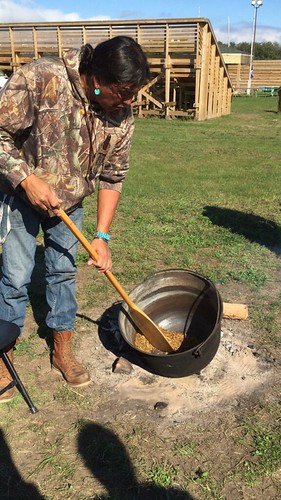
Autumn is a time to reflect on all that we have to be thankful for, as we enjoy the harvest of nature’s bounty during gatherings with family and friends. In Indian Country, culture and tradition are sustained through shared meals with family and the community. Traditional foods are a powerful way for each new generation to connect with and honor its history and its ancestors, and participants in USDA’s Food Distribution Program on Indian Reservations (FDPIR) have access to more traditional foods than ever this year. November, Native American Heritage Month, is an especially fitting time to celebrate the addition to FDPIR of bison, blue cornmeal, wild rice, and wild salmon – foods that not only nourish a body but sustain a culture.
In collaboration with the FDPIR community, USDA’s Agricultural Marketing Service and Food and Nutrition Service have been working to identify culturally relevant foods to procure and offer through FDPIR, a program that provides healthy food and nutrition education to an average of 92,500 income-eligible individuals living on or near reservations across the United States each month. The food package offers more than 100 domestically sourced, nutritious foods, including a variety of meat, poultry, fish, dairy, grains, and fruits and vegetables. In both fiscal year 2015 and 2016, USDA received an additional allocation of $5 million dedicated to traditional and locally-grown foods. This fund, authorized under the 2014 Farm Bill and subject to the availability of appropriations, has allowed the exploration of new culinary opportunities for FDPIR.
In late 2015, bison and blue cornmeal became the first traditional foods delivered through FDPIR. More than half a million pounds of frozen, lean ground bison meat have reached program participants throughout the country, with an additional one million pounds already on contract to be distributed over the next year. Two of the three bison vendors are Native American-owned small businesses. Tribes received whole-grain blue cornmeal during the 2015 holiday season, and beginning in mid-2016, have been able to receive this nutrient-rich product year-round.
In August 2016, USDA awarded contracts for two new traditional foods, traditionally-harvested wild rice and wild frozen sockeye salmon fillets. Deliveries of both products are anticipated to begin later this year. The wild rice comes from the White Earth Band of Chippewa and Leech Lake Band of Ojibwe in Minnesota. Both of these tribes administer FDPIR in their communities. The tribes employ the traditional wild rice harvesting practices of hand harvesting and wood parching, and USDA is delighted to have these new USDA Foods vendors on board to provide this specialized product to FDPIR participants. Watch this video to learn more about wild rice harvesting and processing.
This new quartet of traditional foods seeks to meet the cultural preferences of tribes in various regions of the country. The addition of these wholesome foods to FDPIR not only benefits the program participants who receive them but also the Native American vendors who provide them, and USDA is proud to support both ends of the food chain in Indian Country.

